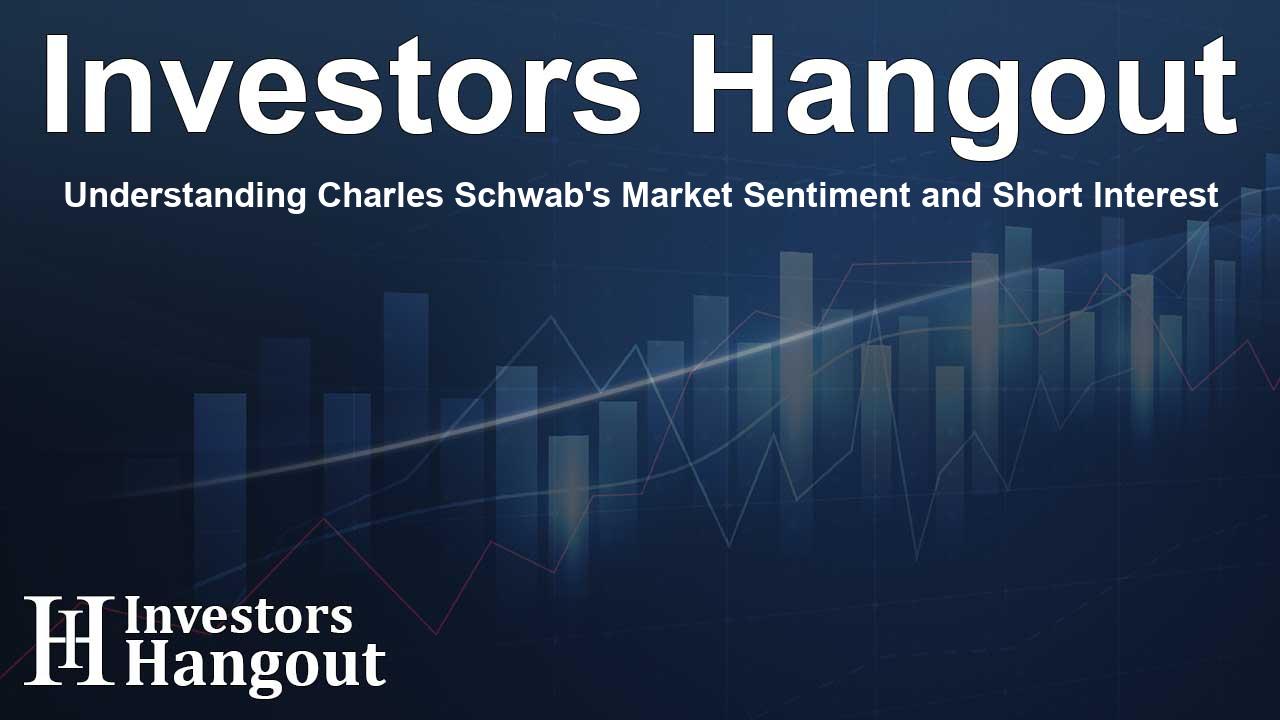Understanding Charles Schwab's Market Sentiment and Short Interest

Understanding Charles Schwab's Market Dynamics
As investors closely monitor the stock market, understanding the dynamics surrounding companies like Charles Schwab (NYSE: SCHW) becomes crucial. Recently, there's been a notable rise in the company's short percent of float, increasing by 4.9%. With a reported total of 18.33 million shares sold short, this represents 1.07% of all shares that are available for trading. Given the current trading volume, it is estimated that it would take approximately 1.98 days for traders to cover their short positions.
The Significance of Short Interest in Trading
Short interest is a vital financial indicator that showcases the number of shares sold short without being covered or closed out. Essentially, it's a reflection of market sentiment. Traders engage in short selling, which involves selling shares they don't actually own with the expectation that the stock price will decrease. Profits from short selling arise when the stock price drops, while losses occur if the price rises.
Decoding Market Sentiment
Monitoring short interest can provide insights into investor sentiment regarding a particular stock. A rise in short interest may indicate that investors have a more bearish outlook on the stock. Conversely, a decrease can point to a more bullish sentiment. Hence, understanding these trends can guide traders in making informed decisions.
Analyzing Charles Schwab's Short Interest Trends
A closer look at the trends surrounding Charles Schwab's short interest reveals intriguing patterns. The percentage of shares being shorted has increased since the last report. It's important to recognize that this uptick doesn’t necessarily mean that the stock is guaranteed to decline; rather, it signals that more traders are opting to short the stock. This should encourage investors to keep a watchful eye on market developments.
Peer Comparisons: How Does Charles Schwab Stand?
Analysts often utilize peer comparisons to assess the performance of a company. A peer is typically a company with similar traits, whether in terms of industry, size, or financial structure. In the case of Charles Schwab, its peer group average for short interest is recorded at 3.81%, suggesting that Schwab experiences lower short interest compared to many of its competitors in the market.
Positive Implications of Increased Short Interest
Interestingly, some research suggests that rising short interest can be perceived as a bullish indicator for stocks. Increased short interest may signify heightened volatility, which can present trading opportunities for savvy investors. It can lead to short squeezes, where a rapidly increasing stock price compels short-sellers to buy back shares at higher prices, further driving up the stock demand.
Conclusion: Market Sentiment and Future Prospects
As Charles Schwab continues to navigate shifting market landscapes, its short interest and trading sentiment are critical indicators to watch. While the rise in short selling could provoke concern, it may also present unique opportunities for investors. Traders should remain vigilant and consider all aspects of market sentiment while making informed decisions.
Frequently Asked Questions
What is short interest in stocks?
Short interest refers to the total number of shares of a stock that have been sold short but not yet covered. It serves as an indicator of bearish sentiment in the market.
How does short selling work?
Short selling involves selling shares that an investor does not own, anticipating that the stock price will drop, allowing them to buy back shares at a lower price for profit.
Why is understanding short interest important for traders?
Monitoring short interest helps traders gauge market sentiment and make informed decisions about potential investments or trading strategies.
What correlation exists between short interest and stock price movement?
A rise in short interest can indicate a bearish outlook, but it may also lead to bullish scenarios when short squeezes occur as shorts are forced to cover their positions.
How does Charles Schwab compare to its peers in short interest?
Charles Schwab has a lower average short interest compared to its peers, indicating a relatively stable perception among investors when compared with similar companies.
About The Author
Contact Evelyn Baker privately here. Or send an email with ATTN: Evelyn Baker as the subject to contact@investorshangout.com.
About Investors Hangout
Investors Hangout is a leading online stock forum for financial discussion and learning, offering a wide range of free tools and resources. It draws in traders of all levels, who exchange market knowledge, investigate trading tactics, and keep an eye on industry developments in real time. Featuring financial articles, stock message boards, quotes, charts, company profiles, and live news updates. Through cooperative learning and a wealth of informational resources, it helps users from novices creating their first portfolios to experts honing their techniques. Join Investors Hangout today: https://investorshangout.com/
The content of this article is based on factual, publicly available information and does not represent legal, financial, or investment advice. Investors Hangout does not offer financial advice, and the author is not a licensed financial advisor. Consult a qualified advisor before making any financial or investment decisions based on this article. This article should not be considered advice to purchase, sell, or hold any securities or other investments. If any of the material provided here is inaccurate, please contact us for corrections.
